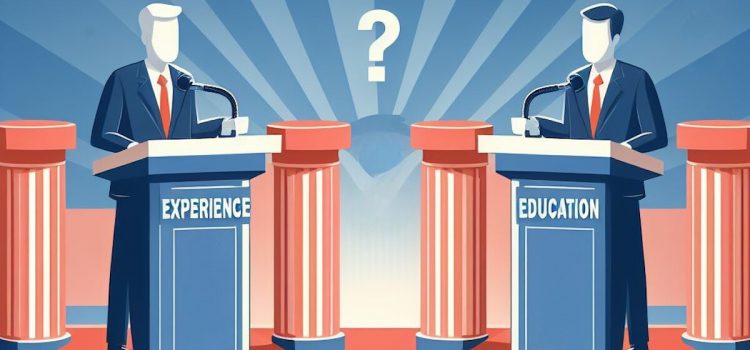
What’s wrong with current hiring practices? Why are many qualified people getting rejected?
Todd Rose wades into the experience vs. education debate in his book The End of Average. He argues that skills outweigh degrees, and he advocates for an emphasis on credentials rather than diplomas in today’s workplace.
Continue reading to understand Rose’s argument, and consider how it stacks up to your own experience and observation.
The Experience vs. Education Debate
Employees with the opportunity to use their unique skills at work are more fulfilled and productive. However, according to Rose, current hiring practices often prevent workers from getting jobs that they’d be well suited for. A potential hire may have all the skills for a job, but, if they don’t have a prestigious enough degree in a particular field, employers are likely to reject them.
In the experience vs. education debate, Rose takes this position: To ensure that every position is filled by the best possible employee, employers should hire their workers for their skills rather than their educational history. Rose argues that diplomas indicate nothing more than that someone has taken a set of required courses. Diplomas don’t correspond to a specific set of skills, so employers can’t use them to accurately judge whether a potential hire is capable of doing a given job.
Rather than judging potential hires by what diplomas they have, Rose advises companies to judge them based on work they’ve done in the past, which is a more accurate indicator of their skills. In particular, companies should consider applicants who have experience working in an environment similar to theirs, even if it’s outside of their industry. Such applicants are likely to have the skills to do the job well.
For example, if you’re hiring a manager for a software company, a former executive assistant may be a good fit even if they don’t have the same experience in tech as most of your workers. If their past work coordinating schedules is similar enough to the organizational tasks you’re hiring them for, they’re likely to do good work.
(Shortform note: In How Will You Measure Your Life?, Clayton Christensen presents this same idea from an employee’s perspective: If you want to do a specific job, look for opportunities to work in environments similar to that job. This will give you the experiences you need to build the right skills for the job. For example, when Nolan Archibald, CEO of Black & Decker, first wanted to become a CEO, he chose not to directly hunt for jobs with the potential to lead to executive promotions. Instead, he pursued opportunities that would give him leadership experience, including managing an asbestos mine in Canada.)
| Why Stick With Ineffective Hiring Practices? Research has found that less than half of employers are satisfied with the skill level of their new hires. If this is the case, why do so many companies fail to develop more sophisticated hiring strategies and continue turning away applicants lacking prestigious degrees? One reason is that their hiring practices are designed for efficiency rather than quality—filtering out people who lack diplomas means you have fewer applicants you have to spend time on. Another reason is that such hiring decisions are more defensible. To most people in the business world, hiring someone without a college degree seems like a big risk. Hiring managers who only make “safe” decisions by hiring college graduates are less likely to be blamed for poor hiring outcomes. |
Credentials Help Employers Hire Individuals
On a broader scale, Rose argues that the best way we can ensure that more workers end up in jobs that fit them as individuals is by shifting from a diploma-centered labor market to a credential-centered one.
Credentials are alternative educational certificates that represent an individual’s skills more accurately than diplomas. You can earn a credential by passing a single course in a narrow domain, such as accounting or fluency in Spanish. A student’s collection of credentials would accurately indicate all the specific skills they’ve been trained in.
Rose contends that if credentials were more commonly accepted, employers could perfectly identify which candidates would be good fits for the jobs they need to fill. Additionally, credentials would allow workers seeking education to focus on learning the skills they need for the specific job they want to do. In other words, they’d receive a highly individualized education perfectly aligned with their unique goals.
| Separating the Two Purposes of Higher Education The vision of “credentials” that Rose describes here is likely inspired by the ideas of Salman Khan, founder of the online educational resource Khan Academy. Khan describes this same educational system in his 2013 book The One World Schoolhouse. He also refers to these credentials as “microcredentials” to emphasize their narrow focus. According to Khan, higher education is currently performing two separate functions for its students: educating and credentialing (signifying to employers who has specific skills). Mixing and conflating these two functions is what causes trouble: The bachelor’s degree forces job-seekers to spend time and money to learn things they don’t need to know so they can earn a broad, vague credential. Khan and Rose’s system would mean creating separate institutions for each of these functions—universities would handle education, and companies conducting narrow skill-based exams would handle credentialing. Additionally, these institutions would serve two more or less separate groups: Job-seekers looking for credentials can find more direct paths to the skills they need to pass their exams (such as workshops or books). People seeking long-term education or research opportunities can have a more purely academic experience at universities without needlessly investing in broad career preparation. Students in both groups would be spending their time and money exclusively on services that help them reach their goals. |






